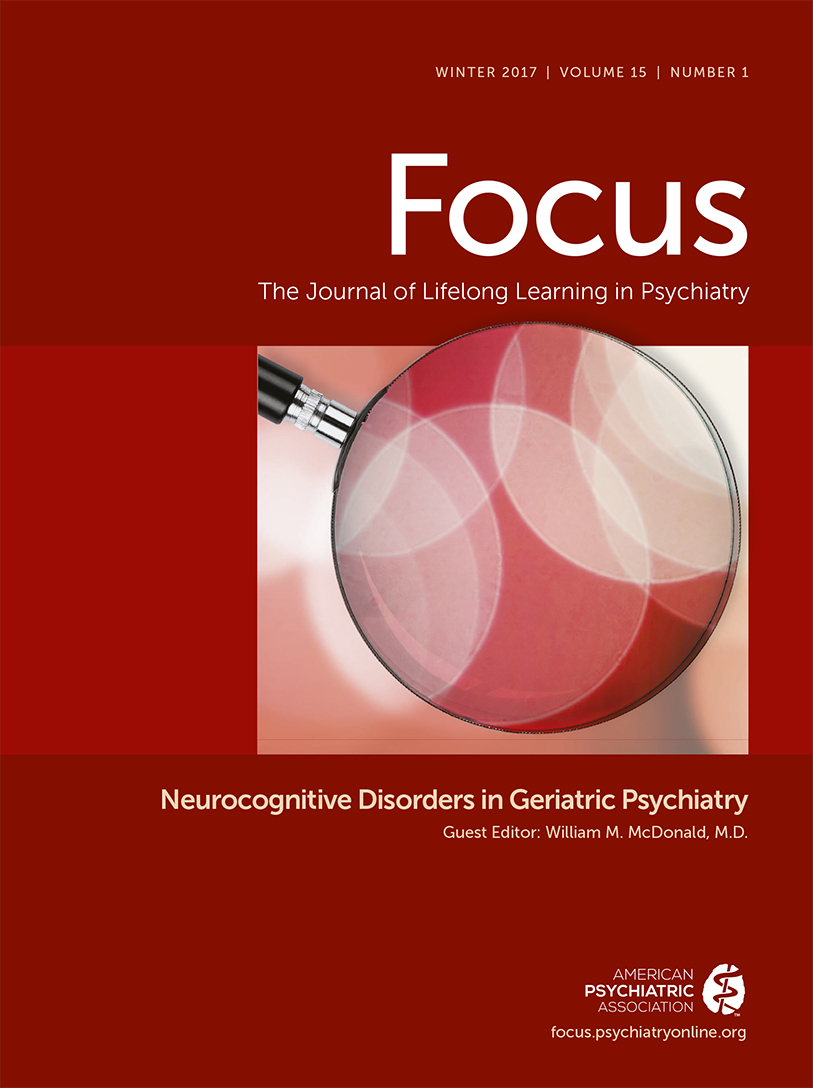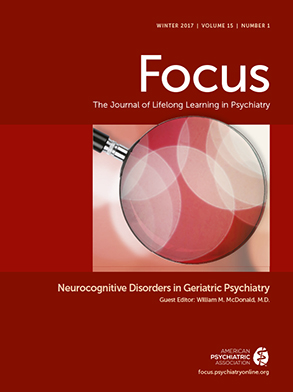“I have a patient with newly diagnosed mild cognitive impairment/early Alzheimer's disease. What are the useful pharmacological and clinical strategies for treating this patient?”
This is a rather large topic, and there is no possibility of a comprehensive review. Therefore, I will simply say what I do in my own practice, relying on decades of practice, and provide a few references in support of this approach.
First, I would confirm the diagnosis by reviewing the basis for this decision. The diagnosis of early dementia is often applied without conducting the “standard workup” for dementing illness. This evaluation includes general medical laboratory screens: electrolytes, complete blood count, urinalysis, serum B12 and folate levels, thyroid screening, and syphilis serology. Of these, thyroid screening is most likely to reveal a source of comorbidity that can have a direct impact on cognitive performance. Untreated/unidentified comorbid chronic physical illness can affect the presence, severity, and progression of dementing illness. The evaluation should include some type of cognitive assessment. This could take the form of the Mini-Mental State Exam or the Montreal Cognitive Assessment (
1).
Second, I review all medications with a particular focus on cumulative anticholinergic toxicity. Most older patients take several medications, and the medical profession has little appreciation of how multiple medications interact. Most dementias have a central lesion in cholinergic neurotransmission. Anticholinergic medications often have negative effects on cognition, especially recent memory (
2).
Third, I prescribe the clinically approved symptomatic medications: cholinesterase inhibitors and memantine. There is a significant, if uninspiring, literature supporting the use of cholinesterase inhibitors (donepezil, rivastigmine, galantamine) with patients with Alzheimer’s disease throughout the course of the disease (
3). The “clinical payoff” from these medications is best when administered early in disease. The same is true for memantine. I offer the following observations from the literature and from my 35-year practice:
1.
Most patients, but clearly not all, show a modest response to cholinesterase inhibitors and memantine.
2.
Improvements in recent memory are generally modest.
3.
As a clinical metaphor, the idea that these medications “push back the clock” by six to 12 months seems reasonable. This may allow the family to make necessary psychosocial decisions (e.g., assisted living or day care placement).
4.
Clinical responders improve in a more general way. They seem more organized and more able to function than persons receiving placebo.
5.
A reasonable therapeutic trial should be conducted with most dementia patients; for example, administer a low dose of cholinesterase inhibitor for one month, and then increase the dose for two months. If response is uncertain, then discontinue the cholinesterase inhibitor and reassess over the next two weeks. This latter discontinuation strategy—discontinuing the cholinesterase inhibitor for two weeks to see whether there is a clinical benefit—can be conducted at any time doing the patient’s illness. With memantine, the prospect of a demonstrable clinical response is less likely. The argument for this compound is that it delays progression of the disease.
6.
Neither cholinesterase inhibitors nor memantine have a direct effect on disease progression. The literature shows modest positive effects that disappear when these drugs are discontinued.
Fourth, I discuss dietary supplements as options. I find that most families desperately seek anything with any possible advantage. I frequently rely on data from either the Baltimore Longitudinal Study of Aging (BLSA) or the Alzheimer’s Disease Cooperative Study (ADCS) group. The BLSA is a study sponsored by the National Institute on Aging and has been in operation since 1958. The ADCS group is a remarkable assemblage of university-based clinical researchers who have conducted several important clinical trials of compounds not routinely sponsored by the pharmaceutical industry. The BLSA has investigated whether a number of compounds, including antioxidant vitamins (e.g., E, C, and carotenoids) and B vitamins (e.g., folate, B6, and B12), delay the onset of disease. Over a 9.3-year observation period, folate, vitamin B6, and vitamin E were associated with a decreased risk of developing clinical Alzheimer’s disease (
4). In a separate ADCS-sponsored study, high doses of vitamin B12 (2,000 IU/day) were shown to delay the progression of disease (
5). A review of the all-cause mortality related to chronic use of vitamin B12 found that the risk of cardiac toxicity increased with vitamin E doses greater than 400 IU/day for patients with pre-existing cardiac disease. Therefore, for my patients with dementia, I endorse the use of vitamin B12 at a dose of 400 IU daily. I also offer observations on the other supplements for the patient and his/her family’s consideration. Most of the studies have focused on disease prevention, not treatment. There is a limited, often negative, collection of data supporting a role for these compounds in treating dementing illness.
Fifth, I then focus on general strategies: diet, exercise, puzzles/games, and socialization (e.g., the Healthy Brain Initiative [
6]). I generally refer to this as the “other half” of the clinical puzzle. The consensus from the Healthy Brain Initiative is that the DASH (Dietary Approaches to Stop Hypertension) diet and the Mediterranean diet are both associated with a decreased risk of developing dementia. There is a modest literature on the positive effects of exercise, specifically walking, on the delay of disease progression (
www.dementiaguide.com). Walking a minimum of 4 days/week for a minimum of 30 minutes generally yields a positive effect on disease progression in patients with mild Alzheimer’s disease. The use of mind games to delay onset or treat dementia has become a cottage industry. My reading of this literature is that performing games that involve visual recognition and attention tasks have modest positive benefits. I do not think any specific mind game is clearly superior than more conventional activities, including word search puzzles, bridge, and mah-jongg. I worry that our patients will succumb to clever marketing strategies, and this will cause our patients to relinquish scant financial resources for no clear benefit.
Sixth, I encourage some type of socialization program. There is a modest, poorly controlled literature on the benefits of, for want of better words, a social experience. This could take the form of increased participation in senior centers or day programs or increased involvement in church programs. Too often, this need is met by extensive exposure to television. This alienating, mind-numbing experience is, under the best of circumstances, a poor substitute for human contact.

